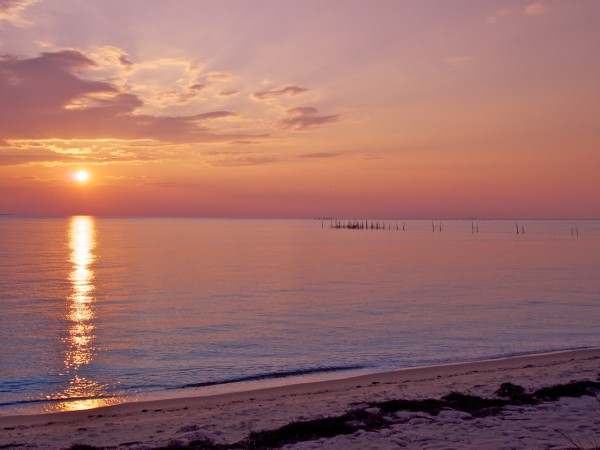A Masshole Visits America: Richmond
“Hey, nice hat!”
I’d just parked in front of my motel room in Richmond, Va., and I turned around and saw a guy with no shoes, no shirt, smiling at me, wearing a straw cowboy hat exactly like mine. He was short and compact but looked like he was made of twisted rebar, and while he seemed friendly enough, he also had a look that suggested he was no more than one remark away from flying into an inchoate rage. I said thanks and slipped into my room. As it happened, a day that had been fairly dull was about to get much more interesting.
The drive down from Atlantic City took me through four states in 324 miles with only about 70 miles on interstates and nearly 40 of them over water. Going south to the tip of Cape May, I boarded a ferry for a 90-minute ride across the Delaware Bay to Lewes, then I’d head south through Maryland and down Virginia’s eastern shore toward Virginia Beach. While technically 24 miles longer and slower than just hopping back on I-95, given the choice between the inevitable traffic nightmare that is Washington, D.C., and a ship with a bar on a sunny Sunday afternoon, I decided that slow was the new fast.
From Delaware, the route passed through mostly flat farm country, which was not unpleasant, but also easily forgotten. As I approached the Virginia border the Dixieland Exxon’s sign announced that “The South Starts Here,” which, as a dyed-in-the-wool Yankee, I took as a warning to behave myself. Judging from the establishments I saw along the road, the chief economic activities of this area were the Tyson chicken plant, sell-your-gold stores, and fireworks stands. (Seriously, there were so many fireworks stands that the place must sound like Fallujah after dark.) But with the Atlantic two miles to my left and the Chesapeake lapping the shore two miles to my right, it’s apparently something of a paradise for fishermen and boaters, and the sea smell was enough to overpower the stench of the chicken farms nearly the whole way. In another instance of something I couldn’t possibly have planned, I hit the Chesapeake Bay Bridge-Tunnel just before sunset and pulled into the scenic area right after the tolls, where I bumbled into this:
The bridge-tunnel itself is a 20-mile engineering wonder that includes two bridges and two tunnels built between artificial islands flanking the shipping channels in the middle of the Chesapeake, opened in 1964 and built for a mere $200 million—about what six feet of the Big Dig cost. Any sense of land falls away quickly, and as I crested the high bridge, I saw the sun setting, just visible above the railing.
The rest of the drive to Richmond was dark interstate, which looks the same as it does in Massachusetts, and as I walked back to my room from the motel Coke machine, I wondered how I could possibly say anything interesting about this day. I ran into my new next-door neighbor again, this time sans hat, revealing a haircut whose parents were a mullet and a mohawk. “Nice car,” he said. “You’re from Mass.? I’m from Springfield, or as I call it, ‘Shitsfield, Suckachusetts.’” Almost a thousand miles from home, and I pull in next to another Masshole.
“I go by Derf,” he said, noting that his legal name was Fred, but nobody called him that since he could never tell when people were yelling Fred, Ed, or Ted, but when they shouted “Hey Derf!” he knew they were talking about him. He was a welder-fabricator, on his way to his girlfriend’s house in North Carolina to help with some renovation. Over the next half hour, he regaled me with tales of two lifetimes’ worth of run-ins with the law, bad luck, and his preferred ultimate demise. “You know how I want to go? Just get on my sailboard, go out into the ocean, and get eaten by a shark. It would be violent, it would be exciting, and I think it would be over pretty quick.”
Just when I thought I knew what kind of round hole I could slot Derf into, he looked around conspiratorially, and said, “Hey, let me lay something on you.” and proceeded to recite Hamlet’s entire soliloquy. “You ever heard that before?” I acknowledged I had, and he replied, “That’s something, man. I say it to myself when I need to get to sleep.” He then flipped open his phone to show me pictures of a bench he’d bought at a flea market (“For five bucks!”) to show me how he turned a piece of near-garbage into something Renovation Hardware would sell for at least a grand. “You know, I do better when I can just focus on one thing. If I start a project, I usually finish it.” The night ended with him giving me his phone number and asking that when I made it to Eureka, Calif., maybe I could send him a picture.
While his worthy-of-a-country-song tales were what initially caught me, on reflection, what stuck with me was that for someone who clearly hasn’t had an easy go at life, I couldn’t detect the slightest hint of resentment or anger at The Man or anything else. He simply seemed like a man better suited for the crew of a 19th-century whaling ship, or trapping fur in the north country, than our modern world, filled as it is with cubicles and computerized court records. But all he needed, he said, was “something small to look forward to”—like a good day of fishing—and he would get by.



